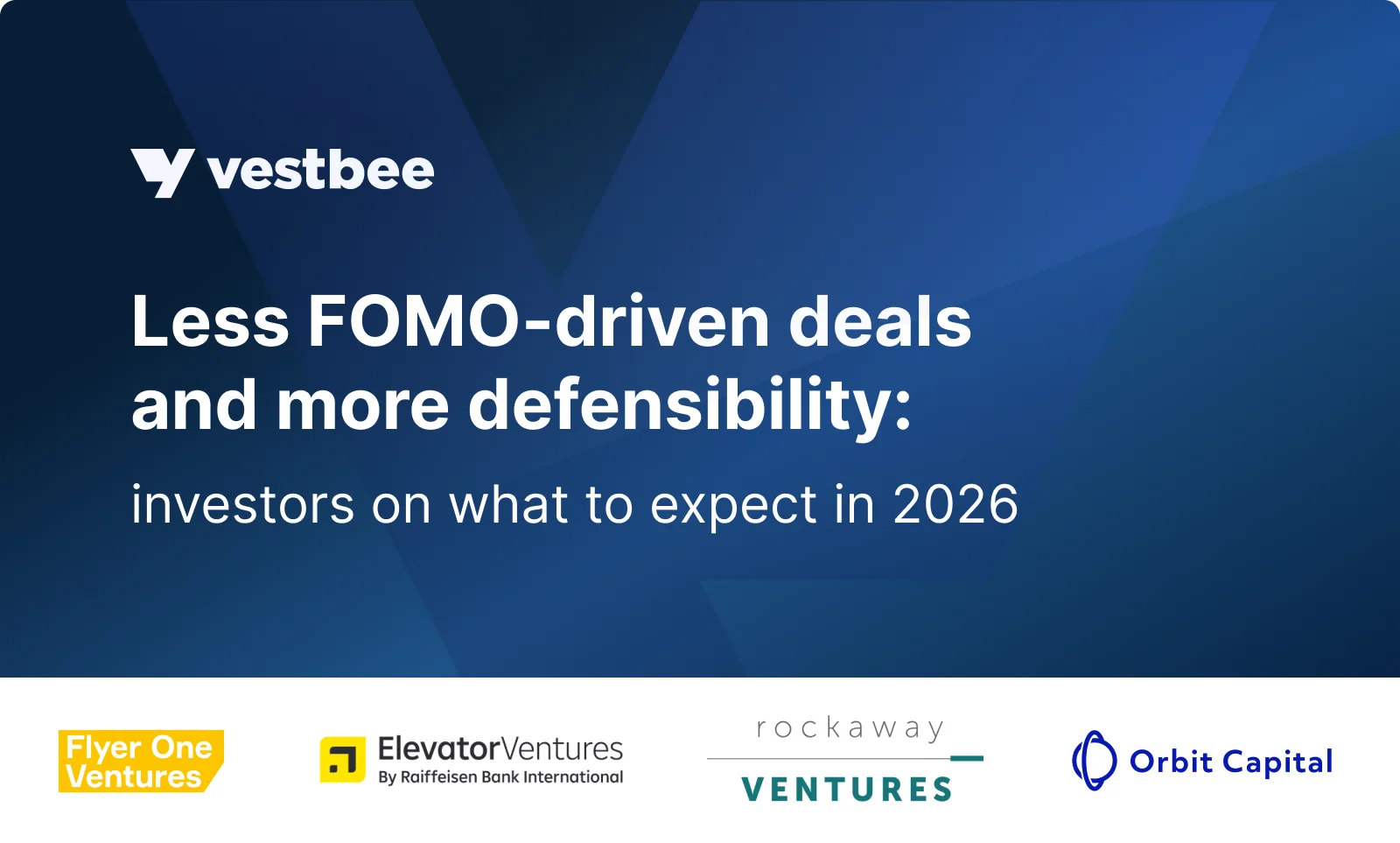“Fundraising in 2024 was challenging but rewarding,” Jakub Barwaniec, co-founder and CEO of Polish contract automation platform Pergamin, told Vestbee, summarizing their experience. As a recent analysis from the tech event Slush revealed, raising money was a primary challenge for most startups this year. While concerns vary across sectors and stages, the consensus is rather clear: 2024 was anything but easy.
We talked to European startups with a global presence operating in fintech, legal tech, martech, hospitality tech, dual-use, defence tech — Flowlance, Embargo, RedTrack, Mifundo, Pergamin, Atlas.co, Bavovna AI, and Origin — all of which successfully secured funding this year, to learn more about the key takeaways from their journeys and the unique challenges they faced along the way.
To find the right investors
All the startups we talked to entered 2024 with ambitious growth milestones, which each of them managed to achieve. However, the journey was far from smooth.
“One of our primary concerns was ensuring we could secure the necessary investment to continue developing our product and scaling the business,” says Patrik Kruntorad, co-founder of Flowlance, which has recently closed a €500,000 pre-seed round.
“The toughest part of 2024 was gaining access to the right investors. Warm introductions were absolutely essential, and they made a huge difference in opening doors. However, even with those intros, it was still a challenge. Many investors were wrapping up their current investment cycles, so there was relatively little money on the market,” he explains.
Despite funding shortages, it is important to prioritize long-term alignment with VC partners over short-term gains, argues Fryderyk Szydłowski, co-founder of Poland- and UK-based hospitality loyalty solution Embargo, which secured $850,000 this year. “We definitely expected 2024 to continue to be a challenging market for fundraising, especially for foodtech / hospitality tech or SaaS in general. Before we took the investors we decided to take at the end of 2023, we did reject — either because we didn’t feel aligned with those investors’ and funds’ vision for Embargo or simply the terms. Given the challenge of the market for the past 2-2.5 years, you can imagine these decisions were not easy,” he claims.
Fredrik Moger, co-founder and CEO of Norwegian mapping solution startup Atlas.co, also highlighted the importance of a well-aligned team of investors. The firm spent around six months actively searching for backers before raising $2 million: “We focused on a handful of investors we wanted to join us while also working to build new relationships from scratch. With our limited network — our last job titles being summer interns — we relied heavily on cold calls and emails, which, to be honest, wasn’t fun.”
Securing public funding was another challenge. In 2024, Estonian fintech startup Mifundo raised €10 million, including €8.8 million in grants from the EIC Accelerator. “The process was complex, with multiple phases, many people involved, and 150 pages of documentation,” recalls Kaido Saar, the startup’s founder and CEO. One key step was a face-to-face interview in Brussels, which the team expected to be standard. However, after coincidentally meeting a successful EIC-backed company, they learned that it was instead an intense pitch to multinational judges and VC, followed by a tough Q&A session. With just a month to prepare, the team refined their pitch and responses.
“It is the first time in Europe a fintech company has gained such funding,” Saar says.
To adjust the product and team management strategy
Besides fundraising, startups focused on refining their offerings, optimizing operations, and addressing the challenges associated with these efforts to drive growth, uncovering interesting and transformative insights along the way.
“This year, we had to rewrite our entire backend, which was almost a year’s work. Our dev team decided to lock ourselves away at the mountain cabin for two weeks and focus fully on the rewrite. It was an amazing experience,” Flowlance’s co-founder shares with Vestbee.
“We worked hard, stayed focused, and got the job done. We’ve realized we should do more of these focused work sessions in the future!” he says.
The lesson martech startup RedTrack learned while improving its solution is that for an established product with hundreds of customers, adopting a “corporate” mindset is crucial to minimize the risk of mistakes. When Google Ads requested re-verification of its integration app, RedTrack temporarily lost key features, leaving its product partially functional. The review process was expected to take 4-6 weeks, causing many users to lose access to critical functionality.
“It was our worst nightmare,” the startup’s CEO and co-founder Vladyslav Zhovtenko says.
The startup quickly developed workarounds and transitioned customers to interim solutions, after which the Google integration app was restored.
A similar story unfolded for the Polish contract automation platform Pergamin, which faced the challenge of managing a complex workload with a lean team. While improving its product for enterprise clients, delays in onboarding and integration arose due to a need for more needs analysis during sales and pre-onboarding. ”This experience underscored the importance of being a close partner to our clients, refining handoff processes between sales and customer success teams, and keeping our R&D team more connected to client needs. Strategic hires, key metrics monitoring and daily team support helped us stay on track,” says co-founder and CEO Jakub Barwaniec.
Startup growth doesn’t always require new hires, and managing a team often demands creative approaches. At the start of 2024, Embargo chose to focus on increasing revenue per customer, product development and optimizing its growth strategy rather than expanding its team. Szydłowski says they treated the business like a high-performing sports team — adjusting strategy and roles instead of adding headcount — resulting in improved unit economics, deal size, and product quality.
“You can only have X players on the pitch, and if someone is not performing well enough, you are not allowed to add an extra player — you need to either improve the game plan or players,” he explains.
For some, HR challenges run even deeper. Latvian defence tech startup Origin faced struggles in hiring engineering talent as the defence industry demands technical expertise and alignment with the company’s mission. “Not everyone is comfortable working in this field,” the startup’s co-founder and CEO Agris Kipurs admits. The lesson for US-Ukrainian dual-use startup Bavovna was starkly different: human errors often caused more harm to such businesses than any algorithm. This realization reinforced its commitment to automating repetitive tasks with AI, a strategy it plans to expand further in 2025.
Dual-use and defence tech: to balance between VC biases, regulations, and real threats
The situation is somewhat more complex for companies in the dual-use and defence sectors, as they face challenges distinct from other industries.
“Fundraising in 2024 is hard, and fundraising for dual-use is 5x harder,” Maksym Prasolov, Bavovna’s co-founder and Chief Growing Officer, claims. “Early-stage funding for dual-use takes about nine months to close. Many investors are biased toward defence because of financial institutions' regulations, additional paperwork, complaints,” he says, highlighting the reluctance of traditional VCs to back military-focused startups, with less than 1% of investors willing to evaluate defence-specific success metrics.
Riga’s Origin, a developer of drone-launched precision-guided weapons, entered 2024 concerned about real security threats and the challenges smaller nations face in bridging limited budgets with urgent defence needs. “Many European countries are under-equipped for real threats, and we feared that the focus might remain on parade-ready displays rather than practical deterrence. Real security isn’t about showing off. It’s about being prepared for the realities of modern warfare,” Kipurs shares with Vetsbee.
At the same time, both startups cite excessive bureaucracy, lengthy sales cycles, and complex regulations. Origin, in particular, faced high entry barriers and complex approval processes but managed to develop their first product, BEAK, in just 18 months, focusing on scaling operations and building trust with NATO countries by delivering deployment-ready systems. “Looking ahead to 2025, our mission remains the same: ensuring that even the smallest nations have access to the tools they need to defend themselves effectively,” Kipurs says.
Meanwhile, Bavovna refined its products through real-world combat testing, gaining a competitive edge in an industry with slow deployment timelines. "Fresh capital will help scale NDAA-compliant production in North America and the EU, enhance product lines, and explore new defence and commercial sectors. We filed key patents for aerial UAV navigation and plan to develop AI tech for maritime autonomy in 2025," Prasolov tells.
Regulatory hurdles, lengthy timelines, and biases against military applications have made defence tech and dual-use funding particularly difficult. Still, the startups remain optimistic.
“The events in Ukraine have been a wake-up call, highlighting the critical importance of the work we do,” Origin’s co-founder emphasizes. “More and more investors have started to realize that this is the main outcome of 2024, for sure: we are on the rise of new tech frontiers in defence, switching to a new technological generation, and this is a trillion-dollar market,” says co-founder and CGO of Bavovna.
To further accelerate in 2025
Despite the challenges of 2024, many startups successfully reached their goals and remain hopeful about the year ahead. This optimism is reflected in the Slush survey data and echoed by startups we interviewed, who are setting ambitious plans for 2025, viewing it as a promising year for further acceleration.
As RedTrack’s CEO and co-founder notes, “Fundraising has always been a significant challenge, whether in 2024 or 2021. It requires time and focus, so it often diverts attention from other critical parts of the business. Now that we’ve secured our funding, it’s great to refocus on our customers, product-market fit, and growth.”







